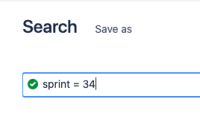-
Suggestion
-
Resolution: Unresolved
-
53
-
39
-
Problem Definition
Sprints can now be affected by complex filters on the origin board if the filter is too complex. The manage sprints permission introduces the "origin board concept for sprint". If the filter query for a sprint is complex (several clauses) it requires the filter either be simplified or the user must have the manage sprints permission for all projects in the instance not just associated projects with the filter. This can cause problems managing a sprint if it exist in several boards as there isn't an easy way via the UI to identify origin board the sprint was created on to resolve the issue.
See blog post Updates on the planned second release of sprint management permission and Sprints shared between multiple boards for reference.
Suggested Solution
Provide a UI method that will show the origin board of sprint to resolve the complex query issue.
Workaround
- Cloud users:
You can use the REST endpoint GET sprint.
That will return a key called originBoardId, with the id of the board as its value.
You can get the id of a sprint by hovering over it in the backlog, and then checking the URL at the bottom of the page, or performing an advanced search:



Once you get the id of that board via the endpoint, you can go to that board by using the URL:
https://<YOUR SITE>.atlassian.net/secure/RapidBoard.jspa?rapidView=<BOARD ID>
- Server users:
Please contact your Database administrator for your JIRA DB to execute the following query to find the origin board for a sprint:select b."ID", b."NAME" as board_name, s."NAME" as sprint_Name from "AO_60DB71_SPRINT" s, "AO_60DB71_RAPIDVIEW" b where s."NAME" = '<SprintName>' and s."RAPID_VIEW_ID" = b."ID";
The above SQL was written for Postgres. Syntax for the query may need to be adjusted for your DB engine.
- is duplicated by
-
JRACLOUD-91025 Provide UI method to identify origin board for a sprint
- Closed
- is related to
-
JRACLOUD-79985 Log actions to the audit log when changes or deletion are made on boards/sprints
- Closed
- relates to
-
JSWCLOUD-5035 As a JIRA/GH administrator, I would like to be able to specify who is allowed to create and start a sprint independently from the "Administer Projects" JIRA permission
- Closed
- mentioned in
-
Page Loading...
-
Page Loading...
-
Page Loading...
-
Page Loading...
-
Page Loading...
-
Page Loading...
-
Page Loading...
